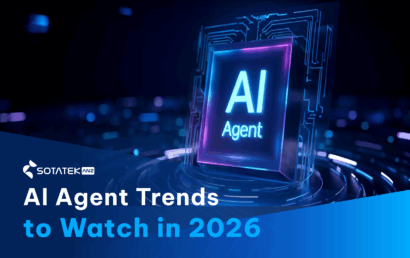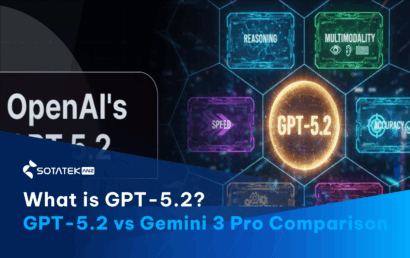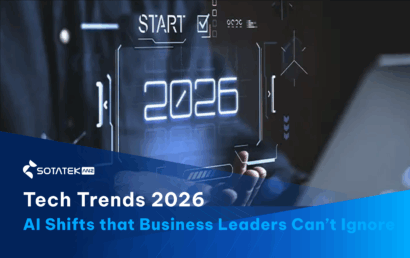Introduction
The Australian AI landscape is accelerating at a remarkable pace. With more than 650 AI companies already operating nationwide and over $7 billion in foreign investment poured into AI in just five years, the sector has moved well beyond hype. In 2023 alone, $2 billion in venture capital went into AI applications, a clear signal that innovation is not only happening. It’s scaling fast. This momentum is further reinforced by the Government AI Strategy in Australia, which aims to boost the economy, strengthen local industries, and build a foundation for long-term prosperity.
In this article, we’ll explore the key AI trends in Australia 2025, how the country compares globally, and what real-world applications look like. At SotaTek ANZ, we’ve seen firsthand how AI is transforming industries across the region, and we’re excited to share insights that can help Australian businesses stay ahead of the curve.
Why 2025 Is a Pivotal Year for AI in Australian Business
Australia has taken on AI with strong growth, supported by both government and industry. The market is expected to reach around $315 billion by 2028, which reflects not only global growth but also local efforts to harness AI for economic and social benefit. In 2023, the federal government formally recognised AI as a critical technology of national interest, making research, development, and adoption a top priority.
For businesses, the impact is already visible. Retailers rely on AI analytics to forecast demand and optimize inventory, while AI is used in the banking industry to detect fraud in real time. Healthcare providers, logistics firms, and agricultural enterprises are also integrating AI into core operations. This shows that this technology is no longer sector-specific but economy-wide.
What makes 2025 a true turning point is the combination of policy, investment, and market demand. Initiatives such as the $17 million AI Adoption Initiative are giving SMEs access to AI expertise, while ethical AI frameworks and emerging regulations are setting the standards for responsible innovation. Globally, AI spending is expected to reach $200 billion by 2025, and Australia is keeping pace. Businesses that adopt now will gain efficiency, personalise customer experiences, and unlock new revenue streams. On the other hand, those that delay risk being left behind.
The hype is over: in 2025, AI has become a practical necessity. With 78% of businesses worldwide already using AI in some form, Australian companies can’t afford to wait. Thanks to a strong local ecosystem of research hubs, startups, and government programs, Australia is well placed not just to adopt AI but to lead in applying it across industries.
Top AI Trends in Australia 2025

Top AI Trends in Australia 2025
Generative AI
Generative AI (GenAI) has become one of the most significant AI trends in Australia 2025, shifting rapidly from experimentation to real business impact. If you are not clear about “What is Generative AI?”, it is a branch of AI that creates new content, such as text, images, audio, or code, based on patterns it has learned from existing data. Adobe’s Digital Trends ANZ report shows adoption has more than doubled in a year, with 29% of organisations now deploying or evaluating GenAI and 12% already reporting production use with measurable ROI. Companies highlight faster content creation, stronger customer engagement through AI-driven personalisation, and improved decision-making as key benefits. It is evident that GenAI is no longer hype but a practical growth driver.
Beyond business transformation, the workforce impact is just as striking. McKinsey estimates that 62% of current task-hours in Australian jobs could already be automated by GenAI and related technologies, with potential rising to 79–98% by 2030. Even under moderate adoption, 25–30% of work hours may be automated, affecting up to 1.3 million workers (9% of the workforce) who may need to transition into new roles. Knowledge-intensive industries like professional services, finance, and education are at the forefront of this shift, driving demand for both digital skills and human-centric capabilities such as critical thinking and problem-solving. Together, these trends position Generative AI as a defining force in Australia’s economy through Q3–Q4 2025 and beyond.
Agentic AI & AI Assistants
Another major AI trend in Australia for 2025 is the rapid rise of Agentic AI and intelligent assistants. Unlike traditional AI that responds passively to prompts, agentic AI can understand intent, make autonomous decisions, and take proactive actions on behalf of users. This shift explains why Australians are adopting these tools at record speed. According to Adobe research, usage of agentic AI in Australia grew by 50% in just three months (March–June 2025). Today, about 18% of Australians report using agentic AI in their daily lives, and 42% expect to adopt it within the next year. This latest AI adoption statistics Australia shows its fast-moving trajectory toward mainstream adoption.
The applications of agentic AI go well beyond task automation like scheduling or summarisation. In Australia, consumers are beginning to use AI assistants to replace traditional search, guide purchasing decisions, and even manage financial or health-related choices. For businesses, this trend is particularly significant in customer experience: from AI-driven chat agents and virtual shopping assistants to proactive service tools that anticipate customer needs. As Q3 and Q4 2025 unfold, more enterprises are expected to pilot or scale agentic systems in sectors such as retail, banking, and government services. The demand for trust, transparency, and responsible governance will grow in parallel, as organisations must ensure these autonomous systems operate reliably and ethically. Together, these shifts position agentic AI as one of the most disruptive and mainstreaming forces in Australia’s AI landscape.
AI Ethics & Responsible AI
As AI in 2025 scales rapidly across Australia, responsible AI and ethical governance are no longer optional but essential components. Businesses are increasingly held accountable for how their AI systems impact privacy, fairness, transparency, and societal trust. According to Digital One Agency, ethical AI frameworks, explainable AI (XAI), and mandatory AI impact assessments are becoming core expectations, not just from regulators but from customers and partners.
One striking statistic: Gartner predicts that in the end of 2025, 85% of AI projects risk failing if ethical issues aren’t addressed early in the development cycle. This risk is compounded by Australia’s evolving regulatory environment—with laws and guidelines around privacy (e.g. Australia’s Privacy Act), data rights, and AI ethics pushing companies to embed values like fairness, accountability, inclusivity, and transparency into every step—from data collection to model deployment.
To manage these pressures, businesses in Australia are adopting several best practices:
- Defining ethical AI principles early, with cross-functional oversight committees;
- Ensuring data quality and diversity to reduce bias;
- Employing explainable models or auditing tools to make AI decisions understandable;
- Enforcing privacy and security by design (anonymisation/ federated learning, secure data handling);
- Conducting impact assessments before and after deployment;
- Ensuring accountability through transparent governance structures.
In Q3–Q4 2025, the trend indicates an acceleration in regulation and enforcement, combined with customer demand for more ethical AI. Organisations that embed trustworthy, transparent, and responsible AI practices will likely gain competitive advantage, avoid regulatory penalties, and build stronger customer loyalty. Meanwhile, those slow to adapt may face reputational risk or fail to scale AI successfully.
AI-powered Sustainability
In Australia, businesses and governments leverage AI to meet net-zero goals, reduce waste, and accelerate the clean energy transition. Companies are applying AI for energy forecasting, smart grid management, battery optimisation, predictive maintenance of solar and wind assets, and granular emissions monitoring. This enables both cost savings and measurable carbon reduction causes. In sectors from manufacturing to logistics, AI is also improving energy efficiency, cutting waste, and supporting transparent ESG reporting.
Yet, the sustainability of AI itself is under scrutiny. Large models and data centres consume significant energy, and without renewable power they risk undermining green progress. Australia, with its strong renewables sector and planned green data centres, is well-placed to lead in sustainable AI adoption. As Q3–Q4 2025 unfolds, more Aussie businesses are expected to invest in AI that not only drives efficiency but also delivers tangible climate benefits, turning sustainability from a compliance requirement into a competitive advantage.
Australia in the Global AI Race: How We Compare AU vs the World
In 2025, Australia is adopting AI quickly, but experts warn the nation is falling behind the global leaders. Atlassian co-founder Scott Farquhar has called AI a new industrial revolution. He argues that without urgent action, Australia could remain a consumer of foreign technology rather than a creator. He estimates that AI could add up to A$115 billion a year to the economy by 2030, but only if the country moves decisively in the next two years.
Australia has clear strengths. It has abundant renewable energy, critical minerals, and a fast-growing data centre ecosystem. These assets can be leveraged to close the gap with countries like the US, China, Singapore, and Finland, which are far ahead in AI R&D and investment. However, weak funding, limited AI talent, and public distrust continue to slow progress.
Analysts say Australia must find its own role in the global AI value chain. Instead of copying frontier research labs, the country can focus on powering AI growth through clean energy, data centres, and entrepreneurship. This approach could allow Australia to capture more value from the worldwide AI boom.
There is also a productivity warning. Researcher Rocky Scopelliti describes a “productivity paradox,” where Australia risks missing out on near-term efficiency gains that peers are already achieving. To avoid this, business leaders need clearer AI strategies, more investment in skills, and supportive regulation. At this stage, many organisations are looking for trusted partners to guide implementation. If your business is planning to implement AI into operations, check Top 5 Best Providers for AI Solutions in Australia to find the right AI partner.
AI in Action: Real-World Case Studies from SotaTek ANZ
SotaTek ANZ has built a strong portfolio of AI solutions that align closely with the AI trends in Australia 2025. From generative AI and agentic assistants to sustainability-focused systems, our projects demonstrate how businesses can translate emerging technology into measurable value. We have partnered with clients across finance, retail, and enterprise services to deliver customised AI tools that enhance productivity, improve customer engagement, and support sustainable growth.
One standout example is SotaAgents, our GenAI-powered intelligent agent product. Designed to act as a proactive assistant, SotaAgents can analyse data, understand context, and carry out tasks autonomously. This reflects the growing agentic AI trend in Australia, where organisations are moving beyond passive chatbots to intelligent systems that guide decisions, improve workflows, and elevate customer service. By combining generative AI capabilities with secure, scalable deployment, SotaAgents showcases how SotaTek ANZ helps businesses stay ahead in the global AI race.

SotaAgents is an AI-powered conversational platform developed by SotaTek as a Minimum Viable Product (MVP)
Explore more about SotaAgents here: SotaAgents – GenAI Agents Product
Conclusion: Your Next Step in the AI Journey
The AI trends in Australia 2025 highlight both rapid opportunities and pressing challenges. From generative AI and agentic assistants to responsible governance and sustainability, Australian businesses that act now can capture real productivity gains and global competitiveness. Yet data silos, skills shortages, and ethical considerations mean organisations need a clear strategy and the right support.
If your business is looking to implement AI into operations or accelerate adoption, SotaTek ANZ is here to help. With expertise in AI solutions and digital transformation, we can guide your organisation to scale responsibly and effectively. So, contact our AI experts now!







